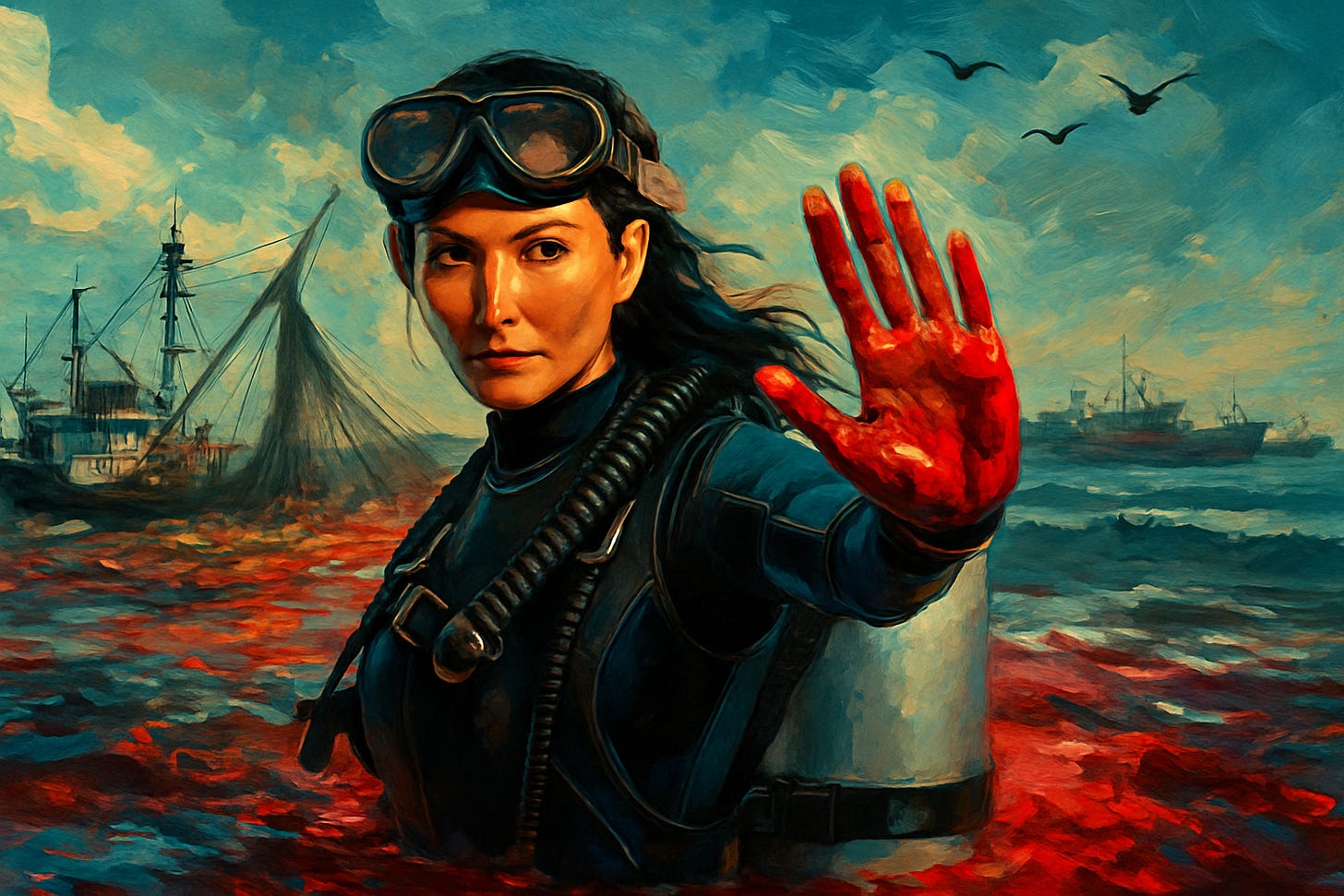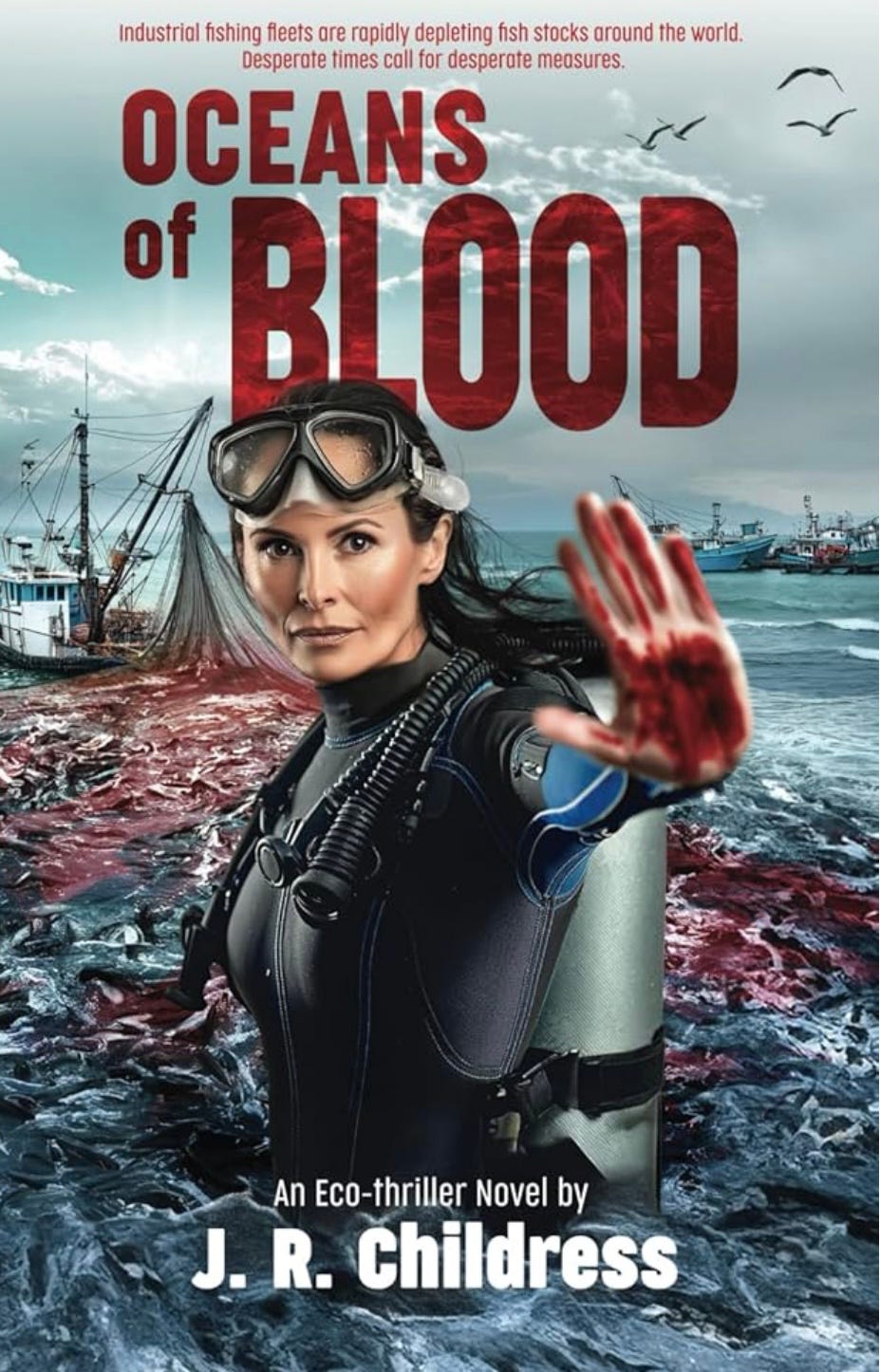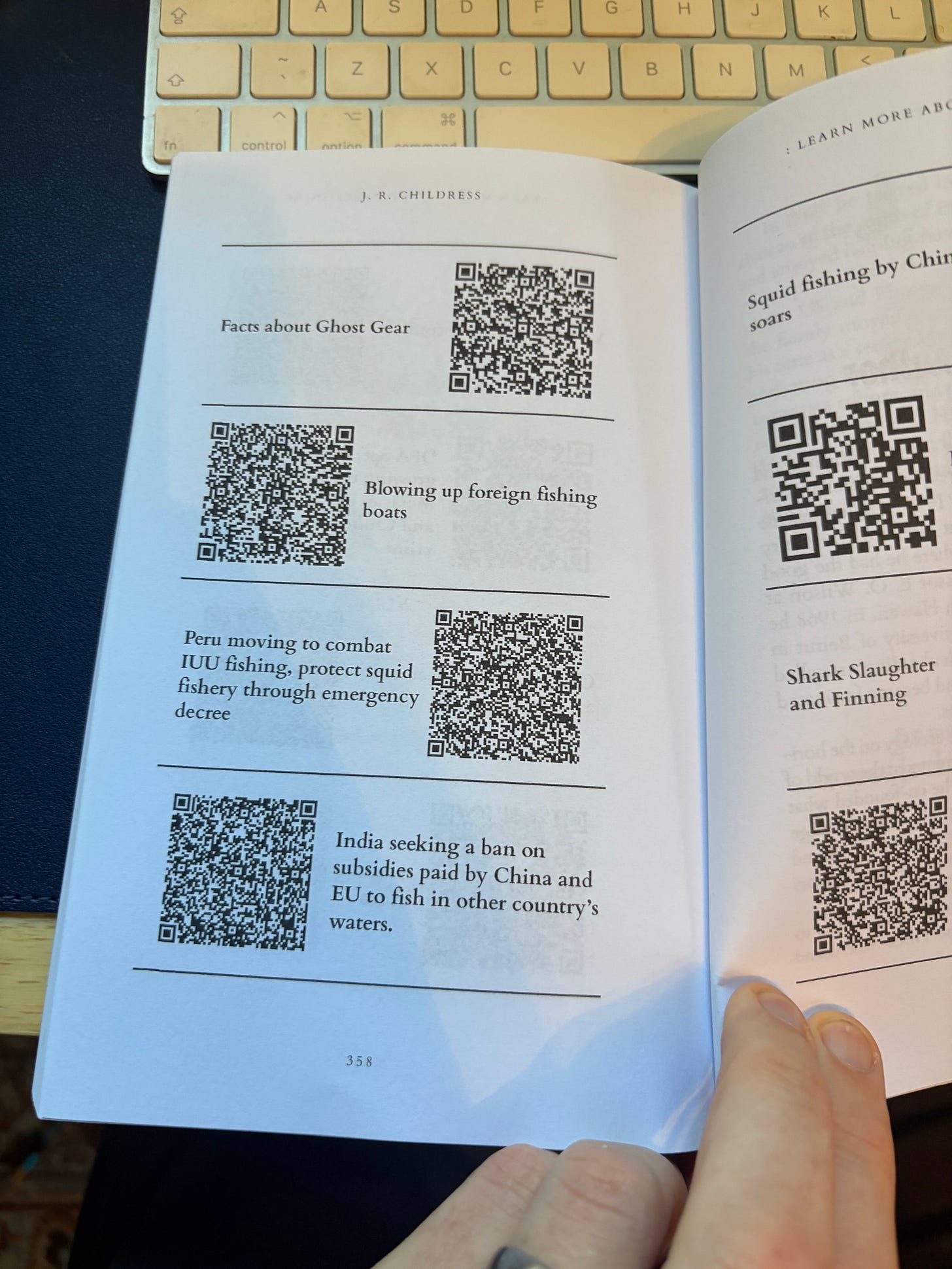The Ocean Thriller You Need to Read
A novel that exposes the true scale of illegal fishing, through page-turning storytelling.
I don’t usually write book reviews, but I felt compelled to make an exception. Communication is at the heart of everything I do. Whether it’s simplifying complex science, explaining the realities of conservation work, or shining a light on the crises our oceans face, my aim is always the same… to make these issues accessible and urgent for more people.
That is why Oceans of Blood stood out. It is not another academic paper or NGO report, but a novel, an eco-thriller that uses storytelling to make the threats of illegal fishing and ocean exploitation vivid and impossible to ignore. Sometimes it takes fiction to reveal truths more clearly than facts alone can manage.
J.R. Childress sets the book an ambitious task, to take the hidden world of illegal, unreported and unregulated (IUU) fishing and render it in the form of a thriller. Instead of a dry policy report or a data-heavy NGO dossier, Childress leans into the language of the airport novel. Encrypted phones, shifting alliances, dramatic speeches at the UN and assassination plots all make an appearance. The result is part Tom Clancy, part environmental journalism.
A Sweeping Story
At the centre of the novel is Professor Carmen Mendoza, a Harvard marine ecologist and outspoken advocate for ocean protection. Drawn reluctantly into the political and personal battles surrounding high-seas plunder, Mendoza becomes the moral and intellectual voice of the book. Her speeches, sometimes echoing Shakespeare and sometimes wielding the blunt clarity of science, frame the novel’s strongest arguments: that overfishing and corruption are not abstract problems but existential threats.
Her adversary is Yungchan Seafood, a fictional Chinese conglomerate that embodies the scale and ruthlessness of the global distant-water fleet. Chairman Xiang, imperious and unapologetic, articulates the worldview of an industry that treats the ocean as an infinite resource: “We can fish anywhere we wish. The open ocean belongs to all of us.” Between them unfolds a global drama that takes the reader from luxury yachts in the Galápagos to tense Beijing boardrooms, from the floor of a UN Ocean Conference in Barcelona to storm-lashed fishing grounds patrolled by activists.
There are explosions, kidnappings, double-crosses and high-level conspiracies. Squid fleets appear on the horizon “like a monstrous forest fire.” Ghost nets drift unseen and lethal beneath the waves. Shark populations collapse in the background as corporate executives and politicians argue over market share. The pace rarely lets up, and even when the prose edges into melodrama it serves the novel’s deeper purpose: to remind readers that the exploitation of the seas is not only a policy issue but a high-stakes battle for survival.
Fiction Anchored in Fact
What gives Oceans of Blood its unusual power is the scaffolding of fact beneath the fiction. Childress has combed through NGO reports, UN documents and investigative journalism to ground his story in evidence. The statistics are real: over 10,000 sharks killed every day for their fins, 90 percent of large fish stocks depleted, billions siphoned from coastal economies by IUU fishing. The characters may be inventions, but the backdrop is not.
Blue Overwatch, the fictional NGO at the heart of the novel, is transparently modelled on Global Fishing Watch. And Childress makes a bold choice in his endnotes. He includes QR codes linking directly to the sources that informed his writing. These do not lead to marketing material, but to hard-hitting journalism and NGO investigations: reports on ghost nets strangling marine life, on Uyghur forced labour in seafood supply chains, on the role of drug cartels in fisheries, and on the harassment of local fishers by distant-water fleets.
In other words, Oceans of Blood does not simply immerse readers in a fictional story. It hands them the tools to keep learning after the last page.
This blend, thriller on the surface and investigative primer beneath, is what makes the book so engaging. For readers unfamiliar with IUU fishing, it is an education in disguise. For those already working in conservation, it is a recognition of the scale of the challenge, told with urgency and imagination.
Why it Matters
The book’s epilogue is a vision of resistance. Mauritania torches 200 illegal vessels caught in its waters. A new generation of “Ocean Angels,” citizen patrols funded by the Sam Mendoza Trust, rise up to defend Exclusive Economic Zones from exploitation. It is fiction, but it reads as blueprint as much as fantasy. You are left with the sense that, with enough courage and coordination, something like this could be possible.
That matters because so much writing on the oceans, even the most accurate and urgent, fails to connect with wider audiences. Policy reports rarely make the heart race. NGO press releases rarely find their way into the hands of travellers in airport bookshops. Oceans of Blood might. By framing ocean crime in the language of a thriller, Childress expands the reach of the conversation.
A Book Worth Recommending
As someone who has spent years working on conservation campaigns, from whaling to fisheries, from captivity to plastic, I found myself nodding through entire chapters. The frustrations of political theatre, the arrogance of industrial actors, the daily destruction that science has already quantified but politics refuses to confront. It was all here, reframed in a way that felt accessible and alive.
That is why I would recommend this book so highly. Not because it is flawless. The prose occasionally overreaches, and the villains are larger than life… but it is original, necessary and brave. It makes the problem of IUU fishing readable for audiences who might never touch an NGO report. It offers conservationists a new language to tell an old story. And above all, it insists that while the threats are vast, the ocean is resilient if we act.
Oceans of Blood succeeds because it entertains and informs at the same time. It is a novel with a mission… to make people care.
Verdict
A bold and important eco-thriller, part Clancy and part conservation manifesto, that deserves to be read widely. For those already fighting to protect the sea, it is a recognition of the struggle. For those new to these issues, it may be the wake-up call that tips curiosity into commitment.






I love the premise of this book. Thanks for the recommendation, Like!
Thanks for the suggestion. It's in my list of recommendations now.